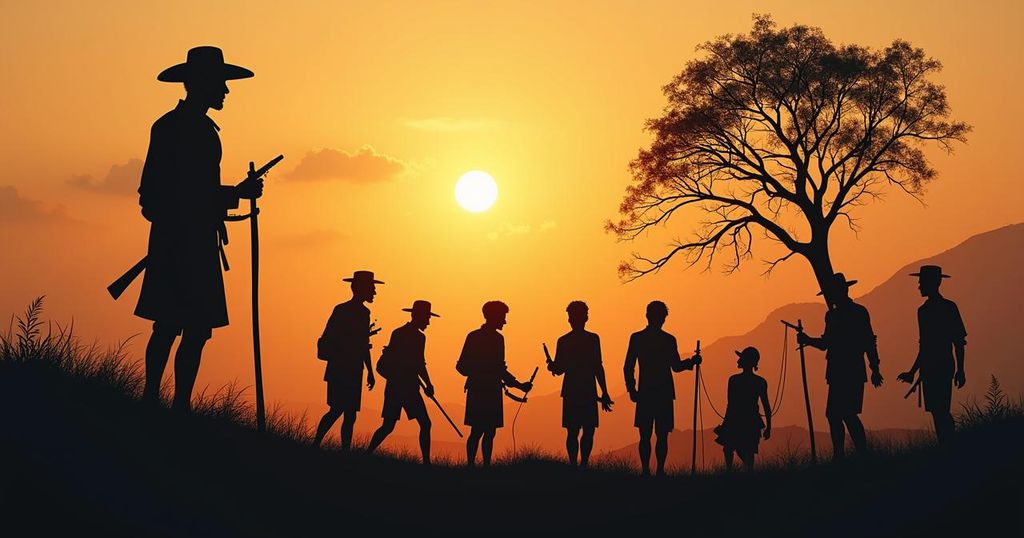The article dissects the parallels and distinctions between the conflicts in Palestine and Kashmir, highlighting their colonial origins and the geopolitical influences in determining support and outcomes. It emphasizes the uniqueness of each situation, particularly their historical contexts and military dynamics, while addressing current international interactions and tensions.
Colonial legacies have led to the ongoing conflicts in Palestine and Kashmir, with their histories intertwined yet distinct. Upon recent mention by Pakistan’s Prime Minister at the United Nations, these two disputes were compared, acknowledging some parallels primarily rooted in colonial exploitation. Israel emerged in 1948 amid the clash between India and Pakistan over Kashmir, demonstrating how colonial manipulations have shaped regional struggles for rights. While military engagements over Kashmir have reached impasses, the Palestinian struggle has been continuous, rooted in varied historical contexts. Notably, the Cold War dynamics heavily influenced the support systems for these struggles; Palestinians received backing from the USSR, whereas Kashmiris gained Western support due to Pakistan’s alliance with the West. The geopolitical climate further differentiates these conflicts. Many Middle Eastern nations, once aligned with the USSR, have faced US-led military interventions, leaving behind destabilized nations like Libya and Iraq. Conversely, India, transitioning toward alignment with Western powers, has not faced the same tumultuous interventions. In the 1990s, Kashmir resistance leaders warned about potential nuclear conflict between India and Pakistan, an appeal that was more of romantic idealism than a realistic threat, a sentiment echoed by prominent thinkers within the Hurriyat Conference. Recent interactions, such as Pakistan’s attempts to internationalize the Kashmir issue, contrast with India’s diplomacy, where it showcased elections in Jammu and Kashmir to foreign diplomats. Geopolitical dynamics at play see China, which has its territorial disputes with India, choosing to foster partnership over confrontation. Pakistan’s assertiveness stands in stark contrast to the quieter responses from India towards China. The role of intelligence in shaping these conflicts cannot be overlooked, particularly in Israel, where advanced surveillance systems constantly monitor territories linked to threats. Operations like the precision killing of Hamas leaders and the preparation against Hezbollah in Lebanon accentuate the meticulous planning influenced by visual and human intelligence. As tensions rise, the conflict in Lebanon may fuel further instability unless major powers intervene to quell the situation rapidly. Through these intricate narratives of struggle, it is evident that the intricacies of Palestine and Kashmir, while sharing legacies of colonialism, are entrenched in distinct historical and geopolitical realities.
The conflicts in Palestine and Kashmir are often viewed through the lens of colonialism; however, despite some nominal similarities, the origins and developments of each dispute are deeply rooted in their unique narratives. This article examines the history of Israel’s establishment alongside the Kashmir conflict and the geopolitical intricacies involving international alliances and alignments, particularly during the Cold War era. It also contrasts recent responses and strategies between Pakistan, India, and China, shedding light on the implications of military engagement and diplomacy over these contentious territories. The article underscores the role of intelligence and surveillance in contemporary conflicts, particularly in the Middle East, illustrating how these elements further complicate the situation in both Palestine and Kashmir.
In conclusion, while Palestine and Kashmir share a commonality through their colonial legacies, the complexities defining each conflict present them as unique struggles shaped by distinct historical, geopolitical, and military influences. The dynamics of international support, national interests, and regional interactions all play critical roles in the ongoing narratives of these disputes. As tensions persist, the importance of understanding these backgrounds is paramount in addressing the future of both regions.
Original Source: www.dawn.com






